MECHANIC SHOP
You can leave the worry behind when you know you can trust us as your preferred shop where you can get all your vehicle repairs done at one location.
Quick, professional and fixed right the first time by trained mechanics that you can trust. Our highly trained technicians do almost every major or minor repair. From oil changes to wheel alignments, brake jobs, auto collision repair and much, much more.
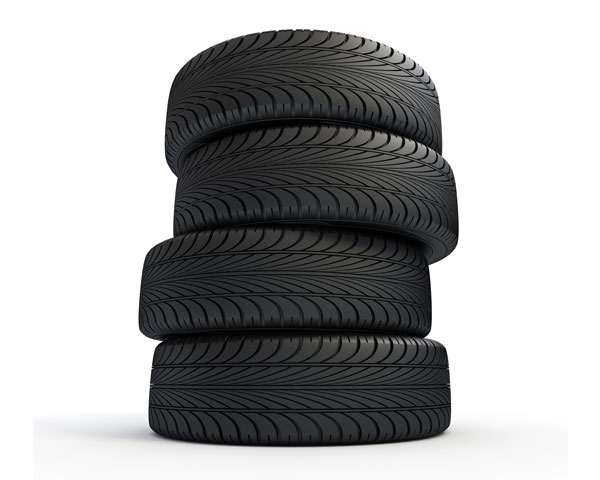
Improve your vehicle’s handling, increase tire life and drive with safety by checking your tires every month to ensure that they are inflated with the right amount of air pressure. We offer a wide range of tires for your vehicle. Let our professionals help you find, balance and mount the right tires for your car.
Below are some of the tire services that we offer:
- Wheel Alignment
- Tire Mounting
- Tire Balancing
- Tire Rotation
- Tire Inspection
Tire Pressure
Having the correct tire pressure in your tires means your vehicle is performing at its best. Properly inflated tires help improve fuel economy and wear more evenly. Not to mention that increased safety that proper tire pressure provides.
Tire rotation service
To feel comfortable on the road, it’s important to have good traction. Due to various factors, including improper alignment, tires may wear unevenly across the tread pattern. Regular tire rotations can help evenly distribute wear and improve the life of your tires.
- Tire Sales
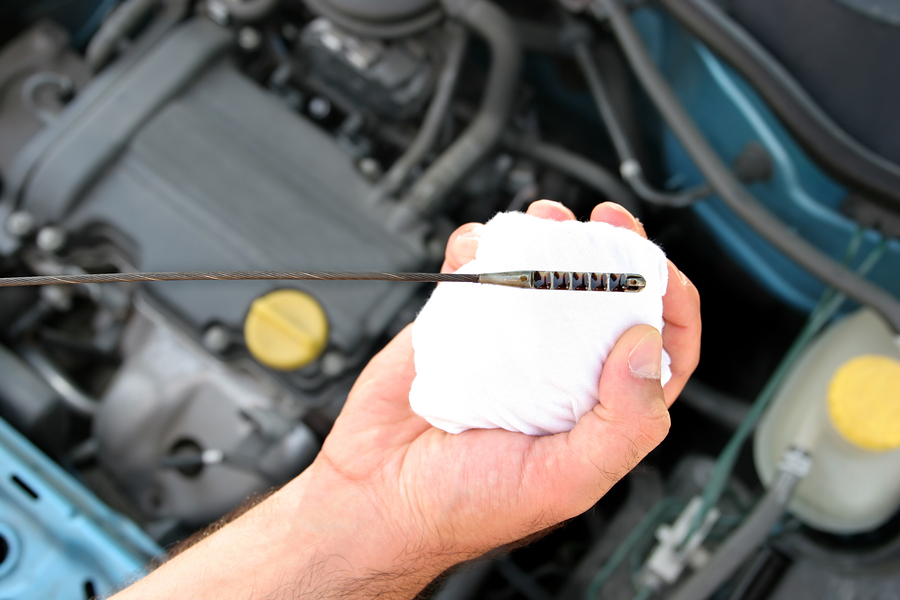
Engine oil is what lubricates a car’s engine, allowing it to run smoothly and last longer. Car owners must maintain a car’s engine by changing the oil and using the oil appropriate for their cars make and model. Almost every car has a check oil light and an easy to get to dipstick under the hood. These components allow car owners to monitor their oil levels and add oil as needed without having to hire a mechanic.
Change Oil Regularly
An important part of routine car maintenance is changing the oil regularly. The necessary frequency of oil changes has become a point of contention among experts. The Engine Oil Manual maintains that engine oil can’t be changed often enough, but Nordic Group insists that, with the advent of detergent oils and multi-weight oils, some vehicles can go as far as 6,000 miles before needing an oil change. The best course of action is to check the owner’s manual and follow manufacturer’s recommendations.
An obvious benefit of changing one’s own oil is saving money, but oil change services frequently advertise bargains. If the “check engine oil” light comes on while driving, this is a strong indication that the car is running low on oil. A driver does not need a mechanic to add oil. However, if the oil light stays on or lights up shortly after adding oil, there may be a leak, and a mechanic should look at the car.
To schedule an oil change you can reach us by phone at 417-778-7080 or 417-778-7081.
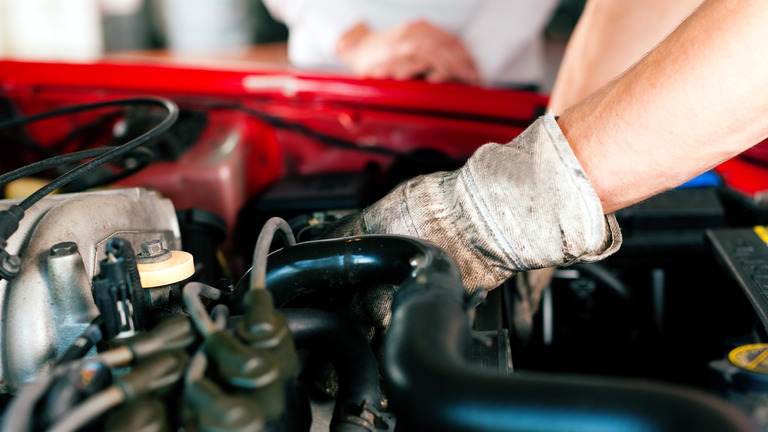
We offer a wide range of mechanical repairs for all your vehicle needs. When you get in the driver's seat of your trusty vehicle, you don't always think about the parts that keep your engine running. From the alternator to the spark plugs, there are a lot of moving components. We offer a local one stop repair shop to meet all your vehicle needs. As your local auto repair shop, we offer a hometown feel you don't get from chain stores. We take your car issues very seriously, with honesty and reliability. Every car that comes into our shop is worked on as if it was our own. We strive to make every customers vehicle reliable and safe.
Whether you need a simple oil change, regular service, new tires or you’re in need of brake replacement, you can be confident that your vehicle is in the best hands. Our experienced technicians, quality auto parts, and customer satisfaction are just some of the services we strive to provide. We have built a reputation for honest and dependable repair service.
- Computerized Diagnostics
- Lift Kits
- Used Vehicle Check
- Roadtrip Check
- Engine Performance
- Full-Service Tune-Up
- Battery
- Alternator
- Starter
- Fuel System
- Oil Change
- Brakes & Calipers
- Suspension & Steering
- Alignment
- Air Conditioning and Heater Service
- Radiator
- New Tires, Mount and Balance & Rotation
- Clutch & Wheel Cylinders & Bearings
- Hoses
- Belts
- Sensors
- Valves
- Switches
- Regulators
- Pumps
- Gaskets
- Filters
- Fluids
- Additives
- Wiper Blades & Motors
- Bulbs
- Fuses
- And many other repairs and services
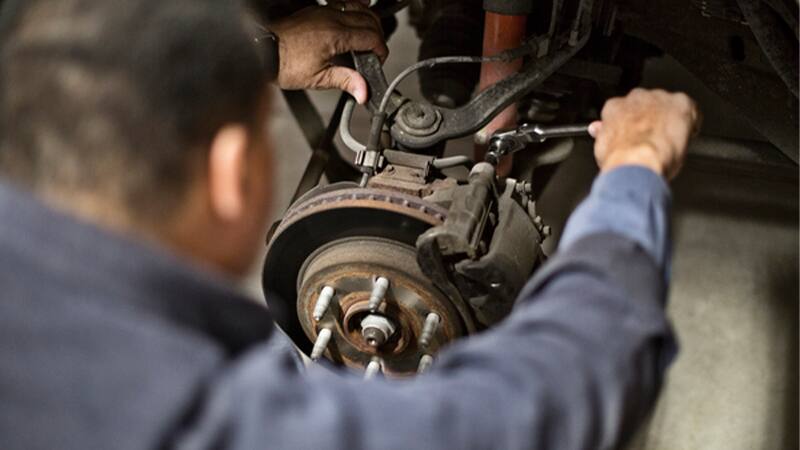
Brakes are pretty much the most important safety device on your car. If you ever partially lost your brakes, you’ll agree that it’s not something you want to experience again. Inspecting your brakes twice a year for wear and damage can protect you and your passengers. It will also help save you money by catching any damage before it becomes too costly.
Brake System Components That Can Fail
The master cylinder, the heart of the vehicle’s braking system, holds the brake fluid when it is not being delivered to the brakes through the brake lines. If brake fluid leaks because the master cylinder is worn or brake lines are plugged or broken, the fluid cannot be delivered, and the brake pads will become ruined.
The brake fluid itself can become dirty or contaminated as it draws moisture, picks up other debris, or it can break down from excess heat. Clean brake fluid is either clear or slightly yellow, while dirty brake fluid may be brown or even black. Old and dirty brake fluid can damage ABS brake systems internally.
The brake lines connect to the master cylinder through a combination valve, which combines a metering and proportioning valve. It regulates the pressure on the front and rear wheels to make sure both sets of brakes are applied simultaneously. A malfunctioning combination valve may cause the wheels to lock up.
Brake pads and shoes can be made of ceramic, metal or organic materials, while the disc rotors and drums they press against are made of metal. Because the pads and shoes create friction to stop the car, they gradually wear down over time and may wear away completely, letting the metal of the calipers and cylinders they are attached to grind against the rotors and drums and damage them. Some pads have a metal strip attached that sounds a warning whistle when the pad becomes too worn, but this strip sounds only when the car is in motion and the brakes are not applied.
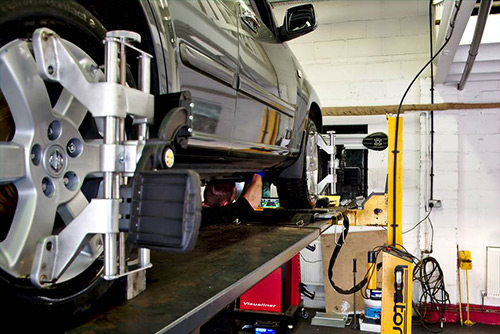
Does your car pull or drift away from a straight line when you let go of the wheel? Do your tires wear rapidly? If so, chances are you need a wheel alignment. Believe it or not, a wheel alignment has many benefits for your car, such as: improved handling, improved gas mileage and greater lifespan of tires.
What are the symptoms of a vehicle out of alignment?
- Excessive or uneven tire wear
- The vehicle pulls to the left or right
- Feeling of looseness or wandering
- Steering wheel vibration or shimmy
- Steering wheel is not centered when the vehicle is moving straight ahead
If you notice any of the above mentioned you may want to have your vehicle checked by a professional.
Frequently asked questions
How often do my car tires need to be rotated?
- Not rotating your tires can be a major cause of your tires needing to be replaced faster than you may have expected. It is recommended that you rotate your tires every 5,000 miles or at the recommended times provided by the manufacturer.
When should I get an engine oil change?
- Vehicle manufacturer’s today recommend oil change intervals anywhere from 3,000 miles to 15,000 miles. Your oil change interval depends on the type of vehicle you drive, the year of your vehicle and more. Contact us today to find out how often you should be changing your oil.

